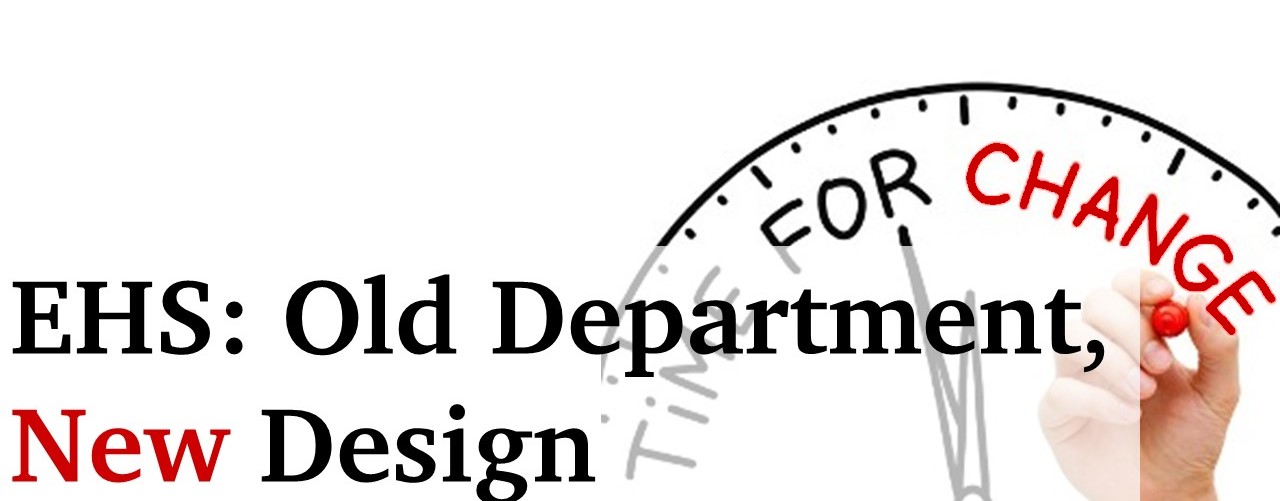
The Department of Environmental Health & Safety (EHS) is a support department that provides safety oversight and guidance to the University community. EHS impacts every individual on campus in some regard. EHS staff are well-versed in the federal, state and local regulations that the university is required to uphold for the safety and protection of our faculty, staff, students, and the environment and surrounding community.
When asked about the new image, Matt Roe, Asst. Vice President, Environmental Health & Safety had this to say,
"The rebranding of the department was initiated to create a cohesive image and vision for the department. It was an effort born out of the need to identify our service objectives and or efforts to develop a University knowledge base regarding safety that has been ongoing for the last five years. We are working to develop programs that are engageable and efficiently address personal and enterprise risk."
As part of the departmental rebranding and updating, EHS drafted vision and mission statements and the selected value and action words to communicate the objectives of the department.
Vision Statement
The Department of Environmental Health & Safety works to instill the value of safe and environmentally-conscious behavior throughout the University community.
Mission Statement
The Department of Environmental Health & Safety seeks to provide a safe and healthy place of employment and learning and to cultivate positive attitudes towards safety, security and preparedness through the establishment and implementation of occupational and environmental protection programs for the University.
Values
Awareness | Expertise | Service | Community | Integrity
Actions
Protection | Prevention | Instruction | Collaboration | Response
New Branding
Many people across campus may be unsure of the role EHS plays for all employees and students at the university. Realizing this, new branding was created in collaboration with the Office of Media & Communications that embodies the responsibilities that EHS performs for the campus community.
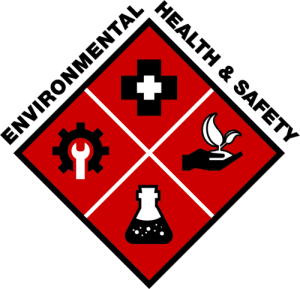
- The health cross represents the programs EHS oversees in protecting the public health like food safety permitting, pool and spa safety and the Occupational Health Program (OHP), which allows employees to receive medical care when needed before or after an incident.
- The plant symbol represents the department's emphasis on environmental protection. Through programs like storm water monitoring, hazardous waste collection and air permitting, EHS ensures that TTU conducts business in a manner that is compliant with applicable federal, state and local regulations.
- The Erlenmeyer flask represents all programs that ensure safety in academia including laboratory and biosafety, radiation and laser safety and facilitation of several of the institutional compliance committees. These committees include the Institutional Laboratory Safety Committee (ILSC), Institutional Biosafety Committee (IBC), and Institutional Radiation & Laser Safety Committee (IRLSC); all of which oversee their respective safety policies within the University Laboratory Safety Manual and approve protocols using regulated materials.
- The gear and wrench represent occupational safety which covers areas of safety such as indoor air quality, ergonomics, confined space entry, forklift operation, and Automated-External Defibrillator (AED) maintenance. Some operations on campus are riskier than others and having staff knowledgeable in the requirements for confined space entry, crane and hoist safety, forklift operation and the lockout/tagout program for machinery is paramount to protecting employees at Texas Tech.
New Initiatives
Safety is a hard sell. No one likes being told they have to do something, even when that guidance has their best-interest at heart. To combat "safety-phobia," EHS has launched several new outreach initiatives to breathe life back into the safety culture at Texas Tech. These initiatives focus on bringing safety information to the campus community in bite-sized sessions which are easier-to-digest and include events that engage and interact with the audience.
GLASS Ambassadors
EHS began recruiting students to form a safety organization last fall. The group,
Graduate Laboratory & Art Studio Safety (GLASS) Ambassadors consists of approximately
25 students from different departments across campus. The vision of GLASS is to "foster
transparency, communication and safety awareness in the management of chemical, biological
and physical hazards that may be present in research laboratories, studios and educational
activities of Texas Tech University." The variety of student backgrounds offer a networking
opportunity for members. These students also meet regularly with advisors from EHS
and discuss safety topics of their choosing in a collaborative atmosphere. Most EHS
personnel have worked in or managed lab spaces and can offer solutions to the hiccups
encountered during research. 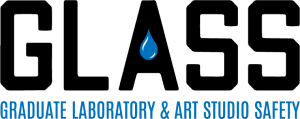
Since the inception in fall 2018, GLASS has elected officers, adopted a logo, drafted a constitution and completed the process with the Office of Student Involvement to become an official student organization of Texas Tech.
While the target audience is graduate students because this demographic spends the most time in the university's labs and studios, undergraduates are also welcome to join. Staff and faculty can also participate as associate members. Meetings take place monthly. Visit the GLASS webpage for more information.
Safe-Science Series
EHS began the Safe-Science Series last fall as workshops to faculty, staff and students on important safety topics that are universal across the many different research areas. Each session covers a safety topic in detail and provides an intimate setting for Red Raiders to ask questions of EHS staff or guest presenters. Most sessions involve hands-on activities. Safe-Science Series segments are hosted at the Teaching, Learning, and Professional Development Center (TLPDC) and take place over the lunch hour (lunch is generally provided).
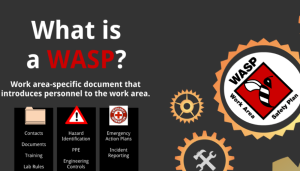
The series segments led by EHS have covered the nuances of building a Work Area Safety Plan (WASP) to the proper use of engineering controls (e.g., chemical fume hoods and biological safety cabinets). The workshops provide extra resources created or assembled by EHS staff, an opportunity to network and discuss with other attendees or presenters, and face-to-face setting to ask questions of EHS staff.
EHS also partners with scientific vendors when able. An installment sponsored by ThermoFisher
brought one of the nation's seven centrifuge safety specialists to Texas Tech to discuss
centrifuge safety. Another installment sponsored by VWR and Kimberly-Clark brought
a personal protective equipment (PPE) specialist of +20 years to Texas Tech to discuss
PPE selection, use and disposal. 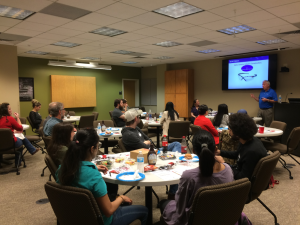
The fifth segment of the Safe-Science Series will be held May 1st and discuss laboratory waste management, one of the most intimidating and hazardous operations undertaken in lab work. Safety officers from the Lab Safety and Environmental Protection sections will cover topics from collection to storage and everything in between, as well as properly preparing your waste for EHS pick up, disposal or treatment. Chemical, biological, glass and sharps waste will all be addressed. Register through the TLPDC Events page and visit the Series webpage for more detailed information on past sessions.
Safe-Science Sessions
The Lab Safety section within EHS has also began offering Safe-Science Sessions in academic departments with hazardous work areas across campus. EHS will typically fill a seminar slot in the regularly scheduled departmental seminar. Presentations are tailored to meet the research needs of the department and based on the top safety departures from the most recent round of safety surveys conducted by EHS.
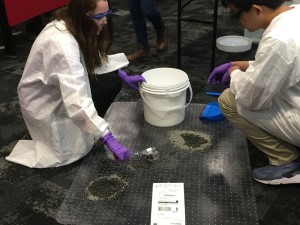 Activities often include hands-on demonstrations of proper glove removal and chemical
spill cleanup procedures. An incident involving a dichloromethane spill and subsequent
acute exposure in March 2018 spurred the decision to teach chemical spill cleanup.
Activities often include hands-on demonstrations of proper glove removal and chemical
spill cleanup procedures. An incident involving a dichloromethane spill and subsequent
acute exposure in March 2018 spurred the decision to teach chemical spill cleanup.
Departments can request a Safe-Science Session by completing the request form online. Sessions are not limited to departments with lab spaces; departments that conduct any academic activity involving chemical, biological, or physical hazards will benefit from a safe science session. Occupational topics can also be covered for non-lab departments, such as ergonomics, indoor air quality, or the safety concern reporting system (SCANs). Visit the webpage for more information.
Safe-Science Office Hours
Another initiative by EHS is an event called Safe-Science Office Hours. Like faculty or TA office hours, EHS staff sit in a location within the department for students to come ask questions. Only a few office hours have been held so far but EHS hopes this option will be utilized more for departments who may not be able to dedicate a seminar slot. To schedule your department or building's office hours, contact EHS at ehs.safety.training@ttu.edu or visit the webpage for more information.
Environmental Health & Safety
-
Address
Texas Tech University, 407 Flint Ave, Lubbock, TX 79409 (Mail Stop 1090) -
Phone
806.742.3876 -
Email
safety@ttu.edu
